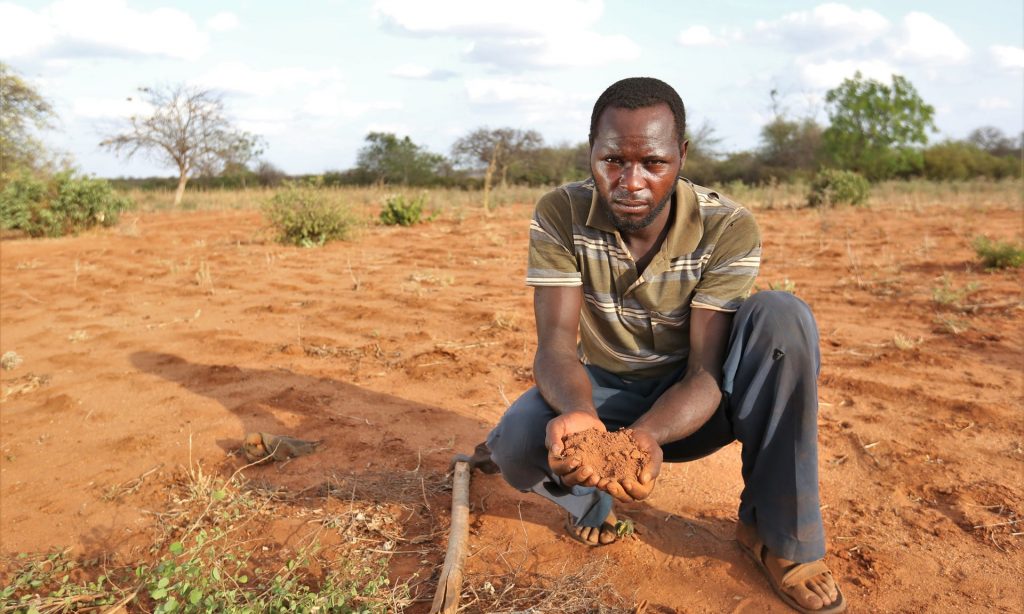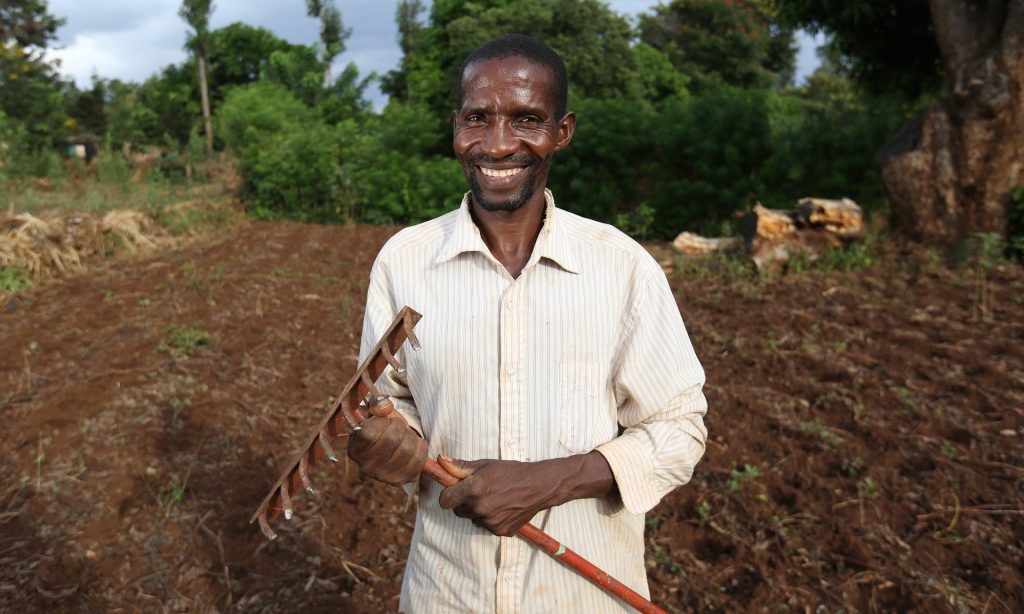
Photograph: Farm Africa
The rains are not what they once were in Kitui County. As climate change bites, the wet season is more erratic and drought has become an all-too-common phenomenon in this rural corner of eastern Kenya.
This year, the community’s produce of peas, sorghum and other staples failed to reach maturity because the rains arrived one month late, says Onesmus Mwangangi, an agricultural expert at the charity Farm Africa. “Farmers in this region have lost more than 80% of their crops due to lack of rain,” he adds.
They are not alone. Much of southern Africa is currently suffering consecutive seasons of drought, prompting the Southern African Development Community to declare a regional disaster and to request $2.7bn in aid. If donors were to follow the recent advice of the UN, a proportion of that funding should be spent on so-called drought-resistant seeds.
Seeds have been conventionally bred to be more tolerant to low water levels for decades. Plants are either conventionally crossed and then screened to identify those with optimum gene patterns or, more recently, they have been genetically modified (GM) to include the desired DNA traits.
Among the early pioneers of conventional cross-breeding for drought resistance are organisations such as the non-profit International Maize and Wheat Improvement Centre and AGRA (supported by the Bill & Melinda Gates Foundation). In Kitui County, Farm Africa is already encouraging farmers to adopt drought-tolerant hybrids of traditional crops, with evidence suggesting these seeds use water more efficiently and, in many cases, mature over shorter periods.
The big guns of the biotech world are also moving in, with seed giants such as Monsanto, Syngenta and DuPont investing heavily in GM strains of drought-resistant crops for the US, but not yet Africa.
Do drought-resistant seeds work?
The evidence in favour of drought-resistant seeds is strong, says Kate Fehlenberg, from the not-for-profit Drought Tolerant Maize for Africa project (DTMA), also funded by the Gates Foundation. Over a five-year period, a total of 2.9 million farmers in 13 African countries covered by the DTMA project saw their yields increase by 20% to 30% after sowing a variety of drought-tolerant hybrids.
Fehlenberg says that the hurdle has less to do with science and more to do with distribution. “The challenge is to get [the seed] out to the farmers … You can have the best corn in the world but it’s no good if it’s sitting in the freezer.”
Some inroads are being made. The Water Efficient Maize for Africa programme, involving Monsanto, for example, saw sales of its drought-tolerant hybrid non-GM seed variety increase by more than 300% last year [pdf], with around 200,000 farmers having used its seeds.

Photograph: Farm Africa
Such successes remain relatively isolated, however. In reality, most smallholder farmers in Africa have yet to hear about drought-resistant seed technology. And those that have are still to be convinced. According to an as yet unpublished survey of more than 4,000 farmers by DTMA, common concerns include the cost, reliability and productivity of these novel seed varieties.
The seed market also needs better regulation, says Fehlenberg. In countries such as Kenya and Tanzania, for example, the sale of fake and falsely labelled seeds is widespread.
DTMA recently set up a seed scaling programme to increase awareness and demand for drought-tolerant varieties among small farmers in Africa. Part of its strategy will be to look beyond formal market channels such as seed companies’ local salespeople and try to access informal farmer networks.
Seeds not the only solution
There are, however, reservations. Seed sovereignty in particular has become a red-flag issue for many farmer groups in Africa. The drought-tolerant seeds have to be purchased anew every year, unlike traditional seeds, which can be regularly recycled. If seed companies like Monsanto end up controlling the sale of drought-tolerant seeds in Africa in the future, many farmers fear becoming locked into cycles of financial obligation as well as losing control over local systems of food production.
The solution, says Clare Oxborrow, senior food and farming campaigner at Friends of the Earth UK, is an approach to seed development, including drought-tolerant seeds, that prioritises local-led breeding and local knowledge.
Seeds are also only one piece of the puzzle, says Fehlenberg. Other important steps to increase resilience to drought include good farm management, effective irrigation, suitable crop insurance, and the use of crops suited to the local climate and soil.
With this advice in mind, Farm Africa currently trains farmer groups in agricultural best practices such as manure-based fertility management, water conservation and proper tillage. The charity is also working to provide improved early warning of potentially extreme weather conditions so farmers can better prepare for drought conditions.

